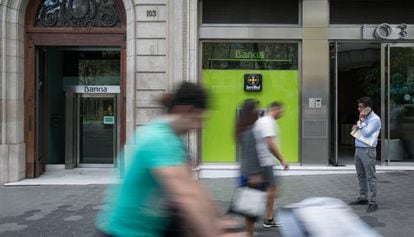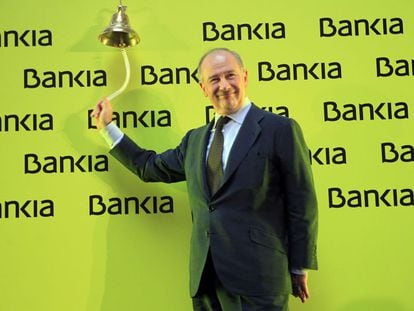Barcelona Bankia branch faces asset seizure over preferential shares
Court officials will enter offices to recover money on behalf of 81-year old widow


A Spanish court has ordered officials to enter a Barcelona branch of Bankia to recover €26,925 in interests and legal fees incurred after the bank knowingly missold so-called preference shares to an 81-year-old customer.
The bank has refused to hand over the money, and the new ruling, the first of its kind, means that unless the branch in question returns the amount, court officials will be authorized to enter the premises on October 3 to recover “money in cash, furniture and belongings”.
The 81-year-old explained she understood she would be able to cash shares in “after a year”
Spanish banks sold more than €5 billion of complex financial instruments such as preference shares and subordinated debt to customers over several years in the first decade of the 2000s, promising them that they could recover their investments at any time.
Bankia alone sold roughly €5 billion in preference shares and subordinated debt, and only a portion of those will likely escape the enforced writedowns. The company began an arbitration process in 2013.
While Spain's nationalized lenders may be able to cope with compensation costs in the millions of euros, Bankia's bill will be the biggest as it sold more of the products than other lenders. And successful claims are only likely to rise as the government tries to quell public anger over how arbitration claims are handled by easing the process.
Bankia began an arbitration process with customers to pay back money in 2013
Earlier this year, in a decision that could affect tens of thousands of investors in Spain, the Supreme Court ruled that Spanish lender Bankia had to return the money spent by two citizens on shares in the bank.
The ruling is based on the fact that the prospectus advertising the bank’s stock market launch contained “serious inaccuracies” regarding the true state of the lender’s finances.
In the case of the 81-year-old in Barcelona, María Rosa Bosch, the court noted that in 2002 the widow, “a pensioner with few resources”, bought preference shares worth €30,000 from Caixa Laietana, which was subsequently merged with Bankia. The manager of the branch, located in the Barcelona neighborhood of San Celoni, described the shares as “guaranteeing high returns”.
But nine years later, when the octogenarian needed money to help pay medical expenses for her daughter, who was suffering from cancer, she was told she could not cash them in. The daughter died in 2012.
A court ruled in the plaintiff’s favor, concluding the bank had not provided “sufficient information” about the risks
Bosch took legal action. During the hearing, the 81-year-old explained that she understood the shares to be fixed-rate and that she would be able to cash them in “after a year”. Only one employee from her branch appeared in court, saying that she knew nothing about the case.
In April of this year, a Barcelona court ruled in the plaintiff’s favor, concluding that the bank had not provided “sufficient information” about the risks involved in the share purchase. It annulled the contract and ordered the branch to return the money, with interest.
Bankia appealed against paying interest and legal fees, which amounted to the €26,925 the court has now ordered be recovered.
English version by Nick Lyne.












































